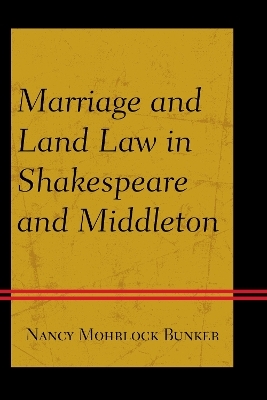
Marriage and Land Law in Shakespeare and Middleton
Seiten
2014
Fairleigh Dickinson University Press (Verlag)
978-1-61147-666-8 (ISBN)
Fairleigh Dickinson University Press (Verlag)
978-1-61147-666-8 (ISBN)
In paired discussions of marriage plays by Shakespeare and Middleton, this book explores the maneuvers that marriageable characters deploy in order to control spousal choice and secure land. Investigation into the milieu of early modern inheritance laws enables a fresh reading of Shakespeare’s and Middleton’s marriage comedies.
Marriage and Land Law in Shakespeare and Middleton examines the dynamics of early modern marriage-making, a time-honored practice that was evolving, often surreptitiously, from patriarchal control based on money and inheritance, to a companionate union in which love and the couple’s own agency played a role. Among early modern playwrights, the marriage plays of Shakespeare and Middleton are particularly, though not uniquely, concerned with this evolution, observing the movement towards spousal choice determined by the couple themselves. Through the late Elizabethan and early Jacobean period, the role of the patriarch, though often compromised, remained intact: the father or guardian negotiated the financial terms. And, in a culture that was still tied to feudal practices, land law held a primary place in the bargain. This book, while following the arc of changing marriage practices, focuses on the ways in which the oldest determination of status, land, affects marital decisions. Land is not a constant topic of conversation in the twenty-one theatrical marriages scrutinized here, but it is a persistent and omnipresent truth of family and economic life. In paired discussions of marriage plays by Shakespeare and Middleton—The Taming of the Shrew/A Chaste Maid in Cheapside, All’s Well That Ends Well/A Trick To Catch the Old One, Measure for Measure/A Mad World, My Masters, The Merchant of Venice/The Roaring Girl, and Much Ado About Nothing/No Wit, No Help Like A Woman’s—this book explores the attempts, maneuvers, intrigues, ruses, and schemes that marriageable characters deploy in order to control spousal choice and secure land. Special attention is given to patriarchal figures whose poor judgment exploits inheritance law weaknesses and to the lack of legal protection and hence the vulnerability of women—and men—who engage the system in unconventional ways. Investigation into the milieu of early modern patriarchal influence in marriage-making and the laws governing inheritance practices enables a fresh reading of Shakespeare’s and Middleton’s marriage comedies.
Marriage and Land Law in Shakespeare and Middleton examines the dynamics of early modern marriage-making, a time-honored practice that was evolving, often surreptitiously, from patriarchal control based on money and inheritance, to a companionate union in which love and the couple’s own agency played a role. Among early modern playwrights, the marriage plays of Shakespeare and Middleton are particularly, though not uniquely, concerned with this evolution, observing the movement towards spousal choice determined by the couple themselves. Through the late Elizabethan and early Jacobean period, the role of the patriarch, though often compromised, remained intact: the father or guardian negotiated the financial terms. And, in a culture that was still tied to feudal practices, land law held a primary place in the bargain. This book, while following the arc of changing marriage practices, focuses on the ways in which the oldest determination of status, land, affects marital decisions. Land is not a constant topic of conversation in the twenty-one theatrical marriages scrutinized here, but it is a persistent and omnipresent truth of family and economic life. In paired discussions of marriage plays by Shakespeare and Middleton—The Taming of the Shrew/A Chaste Maid in Cheapside, All’s Well That Ends Well/A Trick To Catch the Old One, Measure for Measure/A Mad World, My Masters, The Merchant of Venice/The Roaring Girl, and Much Ado About Nothing/No Wit, No Help Like A Woman’s—this book explores the attempts, maneuvers, intrigues, ruses, and schemes that marriageable characters deploy in order to control spousal choice and secure land. Special attention is given to patriarchal figures whose poor judgment exploits inheritance law weaknesses and to the lack of legal protection and hence the vulnerability of women—and men—who engage the system in unconventional ways. Investigation into the milieu of early modern patriarchal influence in marriage-making and the laws governing inheritance practices enables a fresh reading of Shakespeare’s and Middleton’s marriage comedies.
Nancy Bunker is associate professor of English at Middle Georgia State College.
Acknowledgments
Introduction: Patriarchal Marriage, Companionate Marriage
Chapter 1: Thwarting the Enterprising Patriarch: The Taming of the Shrew and A Chaste Maid in Cheapside
Chapter 2: Absent Patriarchs and Present Guardians: All’s Well That Ends Well and A Trick To Catch the Old One
Chapter 3: Marriage Against the Grain of Social Order: Measure for Measure and A Mad World, My Masters
Chapter 4: Assertive Women Broker Themselves: The Merchant of Venice and The Roaring Girl
Chapter 5: Companionate Marriage: Much Ado About Nothing and No Wit, No Help Like a Woman’s
Appendix
Bibliography
Index
| Verlagsort | Cranbury |
|---|---|
| Sprache | englisch |
| Maße | 162 x 235 mm |
| Gewicht | 544 g |
| Themenwelt | Literatur ► Lyrik / Dramatik ► Dramatik / Theater |
| Geisteswissenschaften ► Sprach- / Literaturwissenschaft ► Anglistik / Amerikanistik | |
| Geisteswissenschaften ► Sprach- / Literaturwissenschaft ► Literaturgeschichte | |
| Geisteswissenschaften ► Sprach- / Literaturwissenschaft ► Literaturwissenschaft | |
| Sozialwissenschaften ► Soziologie | |
| ISBN-10 | 1-61147-666-6 / 1611476666 |
| ISBN-13 | 978-1-61147-666-8 / 9781611476668 |
| Zustand | Neuware |
| Informationen gemäß Produktsicherheitsverordnung (GPSR) | |
| Haben Sie eine Frage zum Produkt? |
Mehr entdecken
aus dem Bereich
aus dem Bereich


